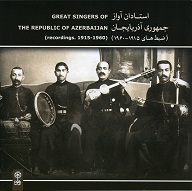 >こちらで紹介されています。というわけで、やっとのことで、アゼルバイジャンの古典音楽 / 声楽、ムガームの歴史的音源をまとまった形で聴くことができるわけです。その現在のムガームの名人、アリム・ガスモフが忽然と登場したときには、よくぞソヴィエト70年の全体主義的統治をかいくぐり、この歌声、歌唱スタイルが生き続けていたものだ、と、感慨深いものがありましたが、民族(言語)、あるいは民俗の伝承、そして文化というものは、全体主義で止まるものではありませんよね。蛇足ながら〜逆に、旧ソヴィエトのくびきが消えた後、民族主義(ことに宗教と結びついた)の沸騰がそこかしこに悲劇を招いたことも既に知られるところです。ごたぶんに漏れず、このアゼルバイジャン(ムスリム95%)も隣接するアルメニア(アルメニア正教会系キリスト教)との紛争が今も続いています。
>こちらで紹介されています。というわけで、やっとのことで、アゼルバイジャンの古典音楽 / 声楽、ムガームの歴史的音源をまとまった形で聴くことができるわけです。その現在のムガームの名人、アリム・ガスモフが忽然と登場したときには、よくぞソヴィエト70年の全体主義的統治をかいくぐり、この歌声、歌唱スタイルが生き続けていたものだ、と、感慨深いものがありましたが、民族(言語)、あるいは民俗の伝承、そして文化というものは、全体主義で止まるものではありませんよね。蛇足ながら〜逆に、旧ソヴィエトのくびきが消えた後、民族主義(ことに宗教と結びついた)の沸騰がそこかしこに悲劇を招いたことも既に知られるところです。ごたぶんに漏れず、このアゼルバイジャン(ムスリム95%)も隣接するアルメニア(アルメニア正教会系キリスト教)との紛争が今も続いています。
それはさておき、ムガームという音楽ですが、もともとはララバイであったりプレイズソングであったりと民謡系であり、古典旋法を持つ歌謡ではなかった、らしいんですが、17世紀頃からこの地を支配したペルシャ系のサファヴィー朝の宮廷で演じられるようになると当然、イラン古典の影響を受けるようになり、いわゆるダストガーやアーヴァーズ(イランの古典旋法〜インドのラーガやアラブのマカム、トルコのマカーム等々に影響を及ぼす)を取り入れ、定型詩をダストガー(及びそのヴァリエーション)に則って即興的に詠唱するという、現在に続くムガームの体裁を整えたようです(だからマカム系の名称を敷衍し、ムガームになったのかも知れませんね。ココちゃんと確認してませんが)。
なので、イランの古典声楽に似ているのは当たり前なんですが、本2CDを聴いていると、やはりイラン声楽同様、高音域でヒバリがさえずるように喉をふるわせる、あのタハリール唱法満載、しかも派手で野趣にも溢れていて、何とも素晴らしいわけです。…アリム・ガスモフが登場した時、タハリールの本場はイーランじゃなくてアゼリじゃねーの?なんて思ったことが、必ずしも間違いじゃなかったような気も…(タハリールの起源はクルドだ!なんて説もありますけど、ま、そういう起源説みたいなものは、たとえ文献がどっかにあったとしても、レコードなんて19世紀末までなかったんだから、確証を得ない推測〜。それに、アゼリの人々は、イランとアラブとアルメニアとクルドとチュルクほかとの混血の人々らしいですから、ある意味、さまざまな文化の交差点的存在でもあるわけで)。
で、それはそれとして、これは重要なことと思いますが、イランの古典声楽アーヴァーズの典雅さ、無拍子〜フリーリズムで歌われる、その悠揚迫らぬ詠唱に較べると、このムガーム、ずいぶんと躍動感があると感じられ、その辺は、様々な民謡的なもの、ララバイや吟遊や祈りの唄が混じり合った雰囲気が色濃く出ているのか?このムガームを楽しむ取っかかりになるんじゃないかと、そう思います。何よりムガームにはリズムがあります。伴奏の形態もタール(弦)、ケマンチェ(擦弦)、ダフ(フレームドラム) 、ナガラ(小型太鼓)と、イランのそれとそう変わらないものの、ダンサブルとまでは言いませんが、歌唱の抑揚に寄りそい躍動するバックの印象は、アーヴァーズのそれと明らかに違うような気もします。そこんところ、じっくり楽しんでいるうちに、何か、アゼリの人々に受け継がれガスモフにたどり着く美意識のあり方がわかるような気もして来ました(ま、ほんとはまだまだよくわかりませんが)。いや〜、久々スリリングな歴史的音源集です!
>こちらで試聴可!?
https://www.youtube.com/watch?v=QDK8KFxBwMw
△参考
The artists
Jabbar Qaryaghdi-oghlu, born 1861 in Shusha (d. 1944) is the oldest singer from whom many recordings are left. It may be one reason why he is the most well known artist of his time, though there were other great singers before him. The chronicles mention Mirza Sattar born in 1830, who sang at the court of the Shah of Persia. It seems that with Jabbar, the science of mugham-s and the vocal art reached perfection. Moreover, not only he had a very unique voice and extended diapason, but also his prestige had not spoiled his personal ethic and his pleasant temperament.
Kechechi-oghlu Mahammad (1864-1940) native of Shusha, he studied with Kharrat Gulu and Mashhadi Isi (d. 1905) and sang sometimes in duo with Jabbar. At the age of 60, he began to teach in Baku, at the invitation of the National Higher Conservatory.
Meshhedi Memmed Ferzeliev was born 1872 in Shusha. He traveled extensively abroad to give concerts and died in Istanbul in 1962. In 1912, he was invited to Warsaw to record more than fourty mughams. In addition to the mugham-s, he brilliantly sung Azerbaijani old songs (mahni).
Mejid Behbudov, born in 1873 in Shusha, moved to Tiflis, modern city and intellectually very active, which had a large population of Azerbaijanis. He died in 1945 at Qazakh, not far from Georgia.
Islam Abdullayev (1876-1964) spent his life in Shusha. After being remarked for his beautiful interpretations of Segah (with its several variants), he was welcomed into the circle of great masters and intellectuals gathered by Mir Mohsen Navvab who wrote 1884 the first treatise of Mugham.
Qurban Pirimov was born in the Qarabagh in 1880 in a family of artists. Since his childhood he was fascinated by the tar and soon became the ultimate reference for this instrument until his death in 1965. He accompanies several singers on this anthology.
Mir Mohsen Aqa Seyid Shushinski, (1889-1965) is originating from the vicinity of Shusha. He also studied the science of mugham-s in the circle of Mir Mohsen Navvab, and his talent was such that Jabbar said that he could die in peace because he had found his successor. He made a long career marked by his personal particularly dramatic style.
Zulfu Adygozalov (1898 – 1963) born in the district of Shusha, was noticed by Jabbar Q. during a concert, and on his invitation, established in Baku to work with this master. Subsequently he formed in his turn many singers.
Khan Shushinski (1901-1979), also from Shusha as its name indicates, enjoyed a thorough training with Jabbar Qaryaghdi-oghlu and Seyid Shushinski. His powerful voice, his knowledge of popular songs and mugham-s and his dedication to music earned him a great popularity.
Yaqub Memedov (1930-2003). While representing the Qarabagh style, he studied in Baku where he was highly appreciated not only for his art but for his wide knowledge of culture and poetry. He received the highest official honors reserved for artists. The included performance of Rast benefited from the new standards (the tape recording) which allow to record a mugham in its full dimension and extend it as a modal system (dastgah) with several modulations (shu’ba). In addition, instead of the tar and the kamancha it is sometimes a more complete ensemble which plays the interludes.
Abulfat Aliyev (1926-1990) from Shusha, was awarded in 1964 People’s Artist of Azerbaijan Republic.
(メーカーインフォより)

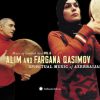 ALIM AND FARAGANA QASIMOV / SPIRITUAL MUSIC OF AZERBAIJAN
ALIM AND FARAGANA QASIMOV / SPIRITUAL MUSIC OF AZERBAIJAN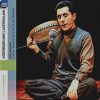 ALIM QASIMOV / AZERBAIJAN, THE ART OF THE MUGAM
ALIM QASIMOV / AZERBAIJAN, THE ART OF THE MUGAM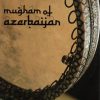 V.A. / MUGHAM OF AZERBAIJAN
V.A. / MUGHAM OF AZERBAIJAN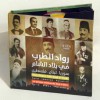 V.A. / EARLY SINGERS FROM BILAD AL-SHAM
V.A. / EARLY SINGERS FROM BILAD AL-SHAM